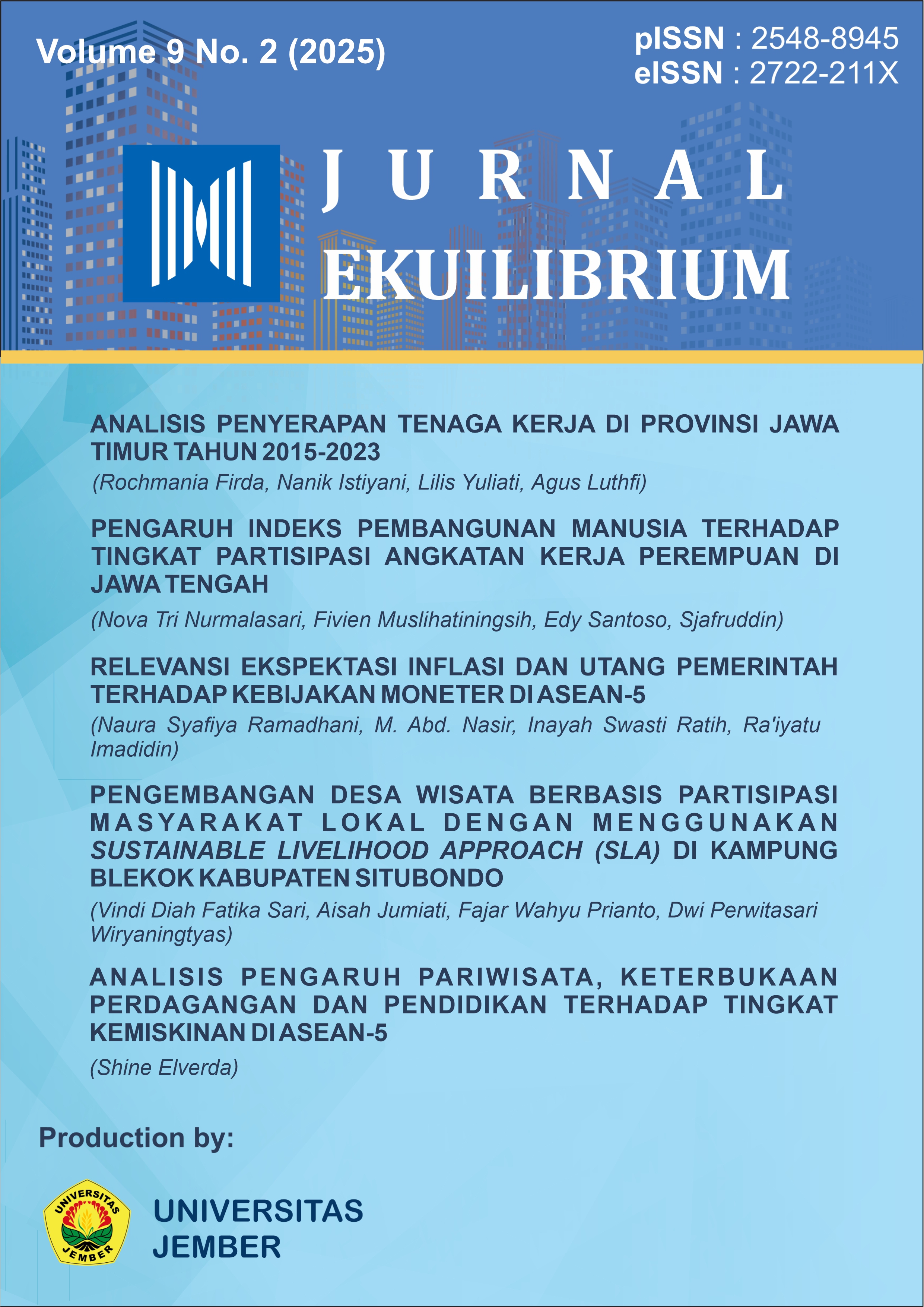RELEVANSI EKSPEKTASI INFLASI DAN UTANG PEMERINTAH TERHADAP KEBIJAKAN MONETER DI ASEAN-5
DOI:
https://doi.org/10.19184/jek.v9i2.53691Keywords:
Ekspektasi Inflasi, Utang Pemerintah, GDP, Kebijakan Moneter, ASEAN-5Abstract
Kebijakan moneter berperan penting dalam menjaga stabilitas perekonomian di ASEAN-5. Ekspektasi inflasi, utang pemerintah, dan pertumbuhan PDB menjadi faktor utama yang mempengaruhi arah kebijakan moneter. Berdasarkan teori ekspektasi rasional, ekspektasi inflasi yang mempengaruhi efektifitas kebijakan moneter. Penelitian ini bertujuan untuk menganalisis perkembangan dan pengaruh ketiga variabel tersebut terhadap kebijakan moneter di ASEAN-5 menggunakan metode Panel Least Square (PLS). Hasilnya menunjukkan bahwa ekspektasi inflasi dan PDB berdampak positif signifikan terhadap kebijakan moneter. Peningkatan inflasi mendorong pengetatan kebijakan, sementara pertumbuhan PDB memberi ruang untuk stabilisasi. Namun, perlambatan PDB dapat mendorong kebijakan pelonggaran guna menjaga stabilitas perekonomian
Downloads
References
Alvinasab, S. M. (2016). Monetary policy and economic growth: A case study of Iran. International Journal of Economics, Commerce and Management, 4(3), 234–243.
Bianchi, F., & Melosi, L. (2017). The dire effects of the lack of monetary and fiscal coordination. Federal Reserve Bank of Chicago Working Paper, No. 2017 19.
Clarida, R., Galí, J., & Gertler, M. (1999). The science of monetary policy: A New Keynesian perspective. Journal of Economic Literature, 37(4), 1661–1707.
Cochrane, John H. “Fiscal Theory and Political Economy.” Princeton University Press., 2023.
Fisher, Irving. “The Theory of Interest: As Determined by Impatience to Spend Income and Opportunity to Invest It.” Macmillan, 1930.
Galí, J. (2008). Monetary Policy, Inflation, and the Business Cycle: An Introduction to the New Keynesian Framework. Princeton University Press.
Ghazali, M. F., & Ismail, N. (2019). The effects of interest rate changes on consumption and investment in ASEAN economies. Asian Economic and Financial Review, 9(1), 123–135.
Granville, B., & Mallick, S. (2004). Fisher hypothesis: UK evidence over a century. Applied Economics Letters, 11(2), 87–90.
Hyman, David N. FEDERAL STATE AND LOCAL GOVERNMENT FEDERAL STATE AND LOCAL TOTAL YEAR Apago PDF Enhancer. 2011, p. 808.
Leeper, E. M. (1991). Policy rules, information, and fiscal effects in a Ricardian world. Carnegie Rochester Conference Series on Public Policy, 34, 265–296.
Leeper, E. M. (2016). Fiscal policy and inflation. Annual Review of Economics, 8, 51–76.
Mankiw, N. Gregory. 2016. Macroeconomics. 9th ed. New York: Worth Publisher
Mishkin, F. S. (2015). Macroeconomics: Policy and Practice (2nd ed.). Boston: Pearson.
Nasir, M. A., Qori’ah, C. G., Wardhono, A., Lestari, S. A., & Indrawati, Y. (2013). ASEAN economic and monetary integration: The feasibility of the optimum currency area. In Prosiding Seminar Nasional Ekonomi dan Bisnis (pp. 1–18). Universitas Jember.
Rahman, M. M., & Aziz, M. A. (2021). Public debt, interest rates, and central bank policy conflicts in emerging markets. Emerging Markets Finance & Trade, 57(10), 2831–2850.
Srithilat, K., & Sun, G. (2017). The impact of monetary policy on economic development: evidence from Lao PDR. Global Journal of Human Social Science: Economics, 17(2), 9–16.
Wardhono, A. (2015). Studi kesinambungan fiskal pada variabel makro ekonomi Indonesia: Analisis VAR. Jurnal Ekonomi Kuantitatif Terapan (JEKT), 8(2), 113–121.
Warjiyo, P. (2003). Kebijakan moneter di Indonesia: Teori dan praktik. Penerbit Salemba Empat.
Wulandari, F. (2022). Ekspektasi inflasi dan transmisi kebijakan moneter di Indonesia. Jurnal Ekonomi dan Kebijakan Publik, 13(2), 101–115.
Downloads
Published
Issue
Section
License
Copyright (c) 2025 Jurnal Ekuilibrium

This work is licensed under a Creative Commons Attribution 4.0 International License.
Authors who submit their manuscripts to be processed for publication at JEK should agree with following points:
1. The author cannot withdraw the manuscript that has been proposed for processing until it receives an answer from the Chief Editor regarding the status of the scientific article manuscript (accepted or rejected for publication).
2. The publisher is not responsible for plagiarism cases for articles published on JEK.
3. The publisher is not responsible for the data and content of articles published on JEK, and is entirely the responsibility of the author.
4. Authors whose articles are published on JEK agree to the following CC-BY license.

JEK by University of Jember is licensed under a Creative Commons Attribution-NonCommercial 4.0 International License.



